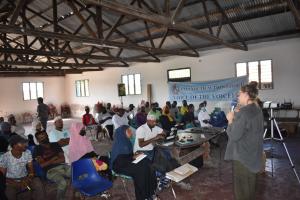Building Capacity of BMUs in Pate Island – Final Report
Faza Youth Action Group (FYAG) began their 5-month project to engage fishery industry stakeholders including Beach Management Units (BMUs), communities and environmental organisations on Pate Island to improve fishing practices.
FYAG identified a lack of awareness and implementation of fisheries legislation. In recent years, more countrywide and international legislation has come into effect banning the use of some artisanal and traditional fishing gears. These gears have been banned to protect marine environments, protect biodiversity, and maintain fish stocks.
However, when these bans came into effect, the reasoning behind it was never made clear to many fishing communities. This led to many fishers being unaware of the gears that are banned and why causing discontent among communities fearing for their traditional way of life.
This project from FYAG aimed to tackle some of these issues by providing educational workshops, and participatory meetings where fishers were able to air their grievances, identify potential solutions and facilitation of a gear swap of illegal gears for legal gears.
Through these workshops, fishers were able to understand the necessity of adhering to the new laws to ensure the sustainability of artisanal fishing and were also grateful for the opportunity of a gear swap as they are unable to buy the legal fishing gears themselves. However, in the process of the meetings, many more challenges and issues were identified.
Some of the issues FYAG identified were:
- Lack of awareness of the BMU regulations and mandates by fishers, communities and BMU management. This is in part due to the regulations, written in English only being inaccessible to many.
- Lack of management training by BMU management committees so strategic decisions are not made efficiently.
- Lack of transparency within BMUs.
- Lack of financial capabilities as some BMUs don’t have bank accounts and committees lack budgeting and finance training which can lead to misuse of funds.
- Lack of education among BMU committees and members means many hold executive positions without having obtained any KGCSEs as many fishers only completed school until Standard 8.
- Lack of proper waste management leads to the degradation of fishing areas including mangrove forests.
FYAG identified that there are solutions to many of these issues including translating the regulations and offering training and scholarships to BMU members. FYAG also identified that fishing communities can see that their way of life is changing due to shifting environments and unsustainable practices. Because of this, there is a deep desire from them to make the necessary changes to promote sustainable fishing in their region.
The fact there is community support for these changes to happen is promising for the future of sustainable fisheries management in Pate. However, these kinds of projects require time, patience, and more funding to facilitate. With that in mind, it seems this project is just the beginning of more sustainable management of fisheries in Lamu.

